No Matter How Much Money the Fed Prints, We Still Can't Afford Nice Things
January 15, 2020
When will the American wage-earner finally tire of the skims, scams, fraud and lies that are now the foundations of everyday life?
You'd think that with the Federal Reserve printing trillions of dollars since 2008, we'd all be able to afford nice things. But you'd be wrong: after 11 years of Fed money-printing, nice things are even more out of reach for all but the favored few who've received the Fed's bounty of freshly created currency.
The Fed's trillions were supposed to trickle down into the real economy, but they never did. All those trillions boosted asset prices and the wealth of the $100 million yachts and private jets elite.
Instead costs have soared while wages have stagnated. If this widening gap between wages and costs were accurately presented, there would a political revolt against the Fed and those few who have benefited so immensely from Fed money-printing: the banks, financiers, corporations buying back their own shares, the owners of high-frequency trading computers, etc.
Despite the best efforts of the government's "suppress all evidence of runaway cost inflation" functionaries, a few facts have slipped through. Let's start with income from 1980 to the present, as per the Congressional Budget Office (CBO). Note that this is all pre-government-transfer (Social Security, food stamps, etc.) income, both earned (wages) and unearned (investment income).
The top households have done very, very well in the past 20 years of Fed largesse, while the incomes of the bottom 80% have gone nowhere.
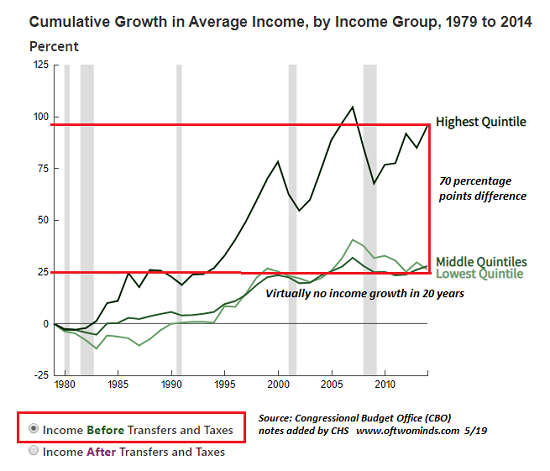
Meanwhile, big-ticket costs of living such as rent have skyrocketed: so how do we buy nice things if our wages are stagnant but the cost of essentials is rising? We borrow more money.
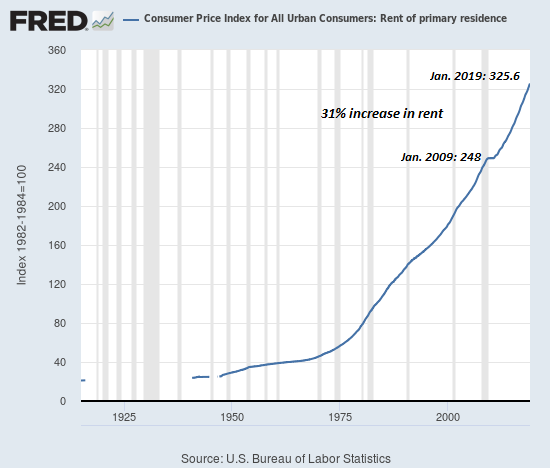
Exhibit A for borrowing trillions of dollars to afford nice things is student loan debt. A college degree has long been worshiped as the ultimate Nice Thing everyone who aspires to middle class Nice Things must have, and thanks to cartels and financialization, student debt-serfs now labor under a crushing load of debt:
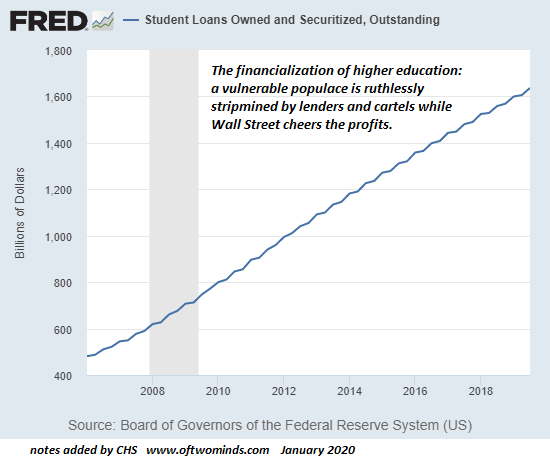
Healthcare is also a Nice Thing that is no longer affordable. Wages nudge up a few pennies while healthcare costs continue soaring.
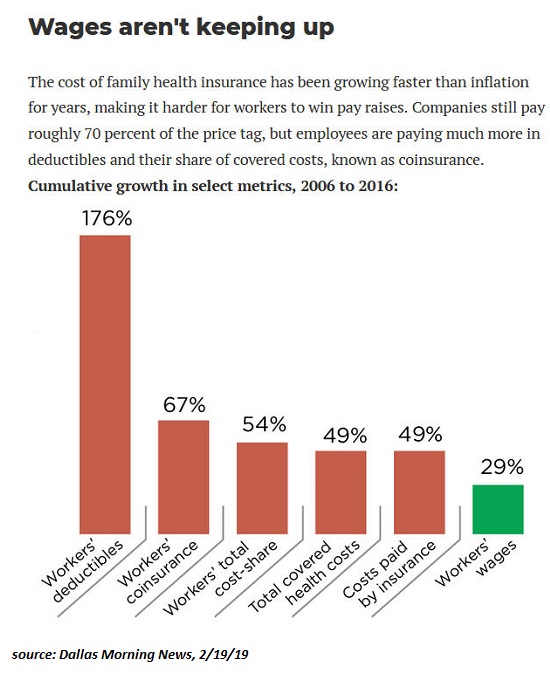
A new vehicle is another Nice Thing that's increasingly out of reach unless you borrow a small fortune. My colleague Bill Rice Jr. did the grunt work of comparing apples to apples on the least expensive autos and discovered a massive divergence between "official inflation" and real-world inflation: according to the BLS, inflation in the category of "New Vehicles" has been practically non-existent for decades, while the real-world cost of new autos has risen by over 200%. No, Autos Are Not "Cheaper Now" (June 28, 2019)
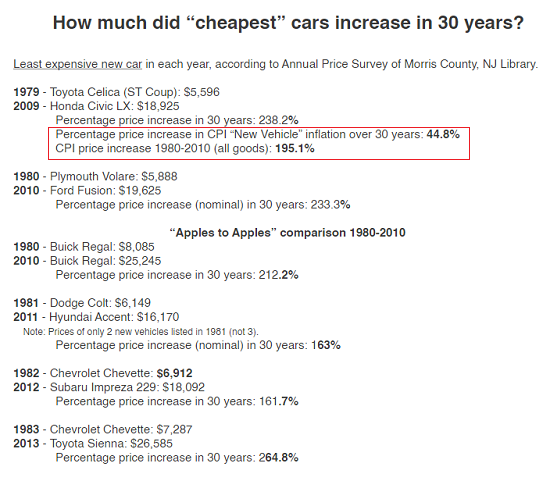
Yes, autos are safer, but are they "better"? Just wait until the electronic motherboard of your Nice Thing vehicle goes out and the repair bill totals thousands of dollars. There goes your "rainy day fund" if you have one, and few do.
The real-world costs are masked or buried until The Moment of Truth: the co-pays of your healthcare are arcane and obscure until the soul-crushing bill arrives, and then your next stop is bankruptcy court.
Meanwhile, the financial assets of the Fed's Favored Few have grown to the point that they now dominate the economic and political order. Corporations can borrow billions to buy back their own shares, further enriching the already-rich, while in the real world we watch other shoppers returning items to the supermarket shelves--they're no longer affordable and so the customer has to put the Nice Thing back on the shelf.
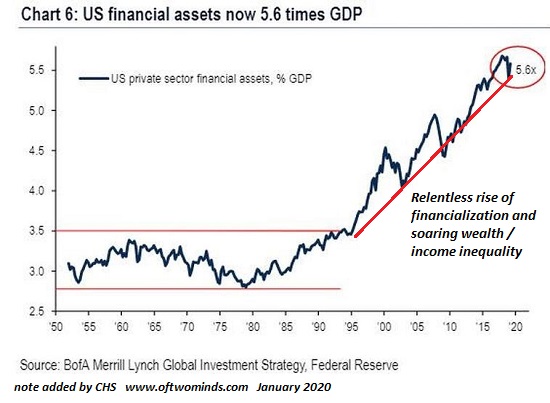
While Apple stock soars to new heights, those outside the the Fed's Favored Few are happy to get a 5-year old hand-me-down iPhone since their old iPhone or Windows OS phone died.
While Mr. Softee (Microsoft) stock soars to new heights, tens of millions of their customers with Windows 7 computers received a notice that Microsoft will no longer support Windows 7, and Mr. Softee "recommends" buying a new computer with Windows 10. Windows 7 is a perfectly adequate operating system, but like the rest of America's tottering economy, "growth" comes only as a result of planned obsolescence, not actual improvements.
When will the American wage-earner finally tire of the skims, scams, fraud and lies that are now the
foundations of everyday life? Probably never, until the toll is paid in failed health
and breakdown. Tax donkeys and debt-serfs can be whipped to continue for only so long, and
then they break down and cannot go on any longer. The trickle of tax donkeys and debt-serfs
who can no longer go on will swell to a flood, and the Fed's Favored Few
will finally face the life-changing consequences of the Fed's lopsided giveaway to the super-wealthy.
My recent books:
Audiobook edition now available:
Will You Be Richer or Poorer?: Profit, Power, and AI in a Traumatized World ($13)
(Kindle $6.95, print $11.95)
Read the first section for free (PDF).
Pathfinding our Destiny: Preventing the Final Fall of Our Democratic Republic ($6.95 (Kindle), $12 (print), $13.08 ( audiobook): Read the first section for free (PDF).
The Adventures of the Consulting Philosopher: The Disappearance of Drake $1.29 (Kindle), $8.95 (print); read the first chapters for free (PDF)
Money and Work Unchained $6.95 (Kindle), $15 (print)
Read the first section for free (PDF).
If you found value in this content, please join me in seeking solutions by
becoming
a $1/month patron of my work via patreon.com.
NOTE: Contributions/subscriptions are acknowledged in the order received. Your name and email remain confidential and will not be given to any other individual, company or agency.
|
Thank you, Chris N. ($50), for your monumentally generous contribution to this site -- I am greatly honored by your support and readership. |
Thank you, Sudheer B. ($25), for your most generous contribution to this site -- I am greatly honored by your support and readership. |

|